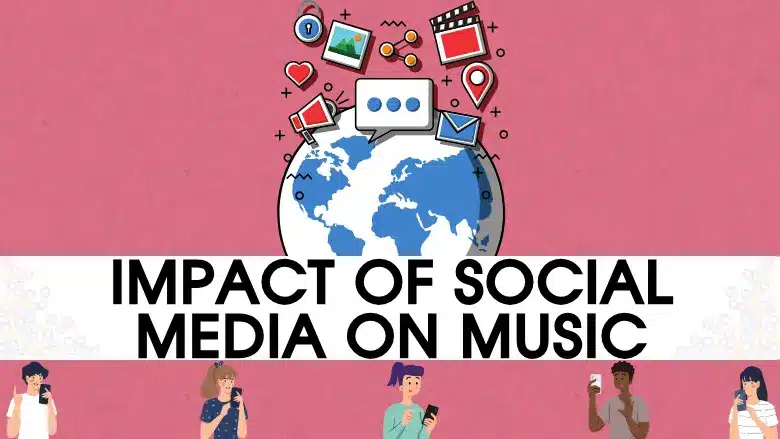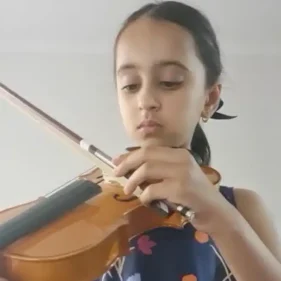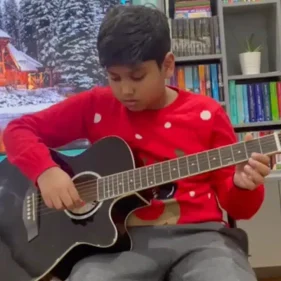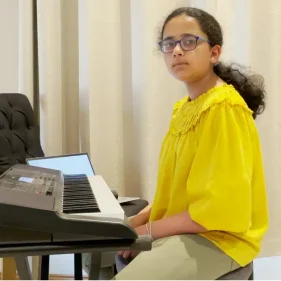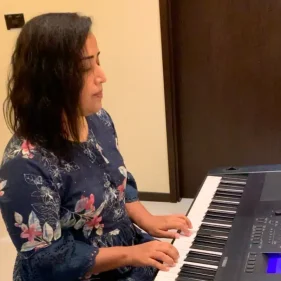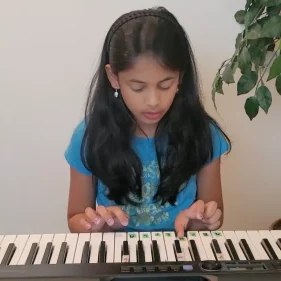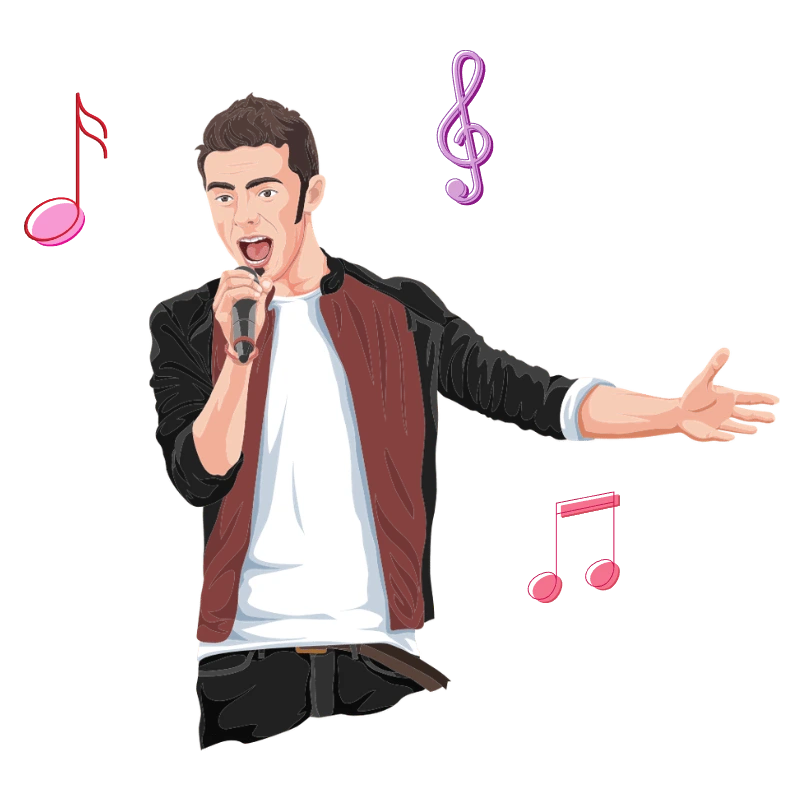- Social media and new artists: a flourishing relationship
- Discovering music through social media
- Today’s technology brings the past melodies alive
- More than just music for musicians: social media has more to offer
- Has social media pushed musicians to choose virality over quality?
- Accessibility – a gift with a price
- A quest to be heard – oversaturation and legal issues
- FAQs
Everything is just one click away, and so is music! Gone are the days when one had to wait in line to hop from one record shop to another to find their favourite vinyl, music CDs, or cassettes. The technological revolution has consistently impacted the music industry and has significantly contributed to the ever-changing landscape of the music world. This blog will jump into social media’s impact on the music industry and how its usage has indefinitely changed the fundamentals—creation, production, marketing, music discovery trends, type of music, and much more.
The influence of social media on music is a hallmark of the digitisation of music. Starting with positives, social media has provided a platform for many artists and musicians to showcase their crafts and not get lost in the struggle of finding a label and industry red tape, significantly lowering the chances of exploitation.
Social media and new artists: a flourishing relationship
This brings us to the overall change in the music environment, which has become much more self-reliant. Previously, big production houses and music labels had the most access to accessibility and marketing tools to promote the artist to a wide range of audiences. Social media and new artists have an extremely beneficial relationship and one of the easiest and most effective ways of marketing one’s music.
Before the audience got familiarised with new artists through music magazines and word of mouth; however, nowadays social media sites such as Instagram, Soundcloud, YouTube and Tiktok have taken the helm of promoting and helping many independent artists to connect with their audiences directly without the need of any middlemen to do it for them.
Discovering music through social media
Different social media platforms cater to different target markets and fulfill different aspects of marketing. For instance, one of the most popular social media platforms among Gen Z is Instagram. Created in 2010, the platform has become one of the best music discovery platforms. The impact of Instagram reels on music popularity is immense. Short-form content helps with the quick spreading of the songs and boosts their virality in a short amount of time. According to Facebook reports, engagement with reels reaches up to 200 billion views daily on both platforms — Facebook and Instagram.
Viral songs on social media, and in the case of the Meta platform, take place when tracks can utilize the algorithm of the social media site to the fullest. The word “trending” has become synonymous with becoming famous. One cannot dismiss social media’s role in viral music trends. Many trends and challenges on social media help boost the virality of tracks. The nature of the trends can vary from purely music challenges, such as “The 30-day Music Challenge”, to being used as BGM from other trends or challenges.
Many content creators share their personalised playlists with their followers, which helps many songs gain traction on different streaming platforms such as Spotify, Jio Saavan, etc. One such example is to discovery inew music through Spotify collaborative playlists.
Youtube
The OG platforms for social media music discovery were SoundCloud and YouTube, which are still some of the best methods to monetise music. Created in 2004, YouTube is an online video-sharing platform.
However, with the rise of music-related content on social media. The San Bruno-based platform launched a new product, an extension of the existing site in 2015, which specifically targeted the music market—YouTube Music. Soon became a competitor to already existing music platforms like Apple Music and Spotify.
Understanding the importance of short-form content and music discovery trends, YouTube also added the feature YouTube Shorts in September 2020. The statistics of engagement are jaw-dropping—since the launch of the feature until May 2024, YouTube Shorts has been used over 5 trillion times.
Soundcloud
One of the easiest and best ways to find new music and simultaneously support independent and indie artists is through platforms that help the musicians directly interact with fans and monetise through their music at the same time. SoundCloud is one of the best social media platforms for indie music discovery. Not only that, the platform helped many artists to break through the wall of mainstream music, including Sunflower singer Post Malone and rappers such as Lil Pump, Juice WRLD, and XXXTentacion. Other streaming services like Spotify and Apple Music give global exposure to the artists and follow the pay-per-stream route when paying the artists.
Today’s technology brings the past melodies alive
Social media platforms not only draw attention to upcoming artists in the music scene, but they also help to bring back many tracks and artists from the bygone era and introduce them to today’s generation. According to the Guardian, the music community of TikTok helped to unearth many old songs, where 20 out of 50 songs were by veteran artists—Christina Aguilera, Tom Odell, and Natasha Bedingfield, to name a few.
More than just music for musicians: social media has more to offer
The use of social media is not limited to music discovery trends; it also helps musicians and artists land many brand deals, advertisements and other career opportunities. The platforms not only help in the discovery of new artists, it helps in networking as well. Artists from different parts of the world are able to exchange their knowledge of music. Social media and technology help break the geographical barrier and facilitate many creative collaborations. That greatly contributes to the commerce aspect of the music industry.
Another economic feature of social media comes from the direct engagement of the artists with their fans. Along with authenticity, many artists can notify about the dates, venues, and ticket prices of their concerts and other performances at a very low price. It provides a personal touch to the whole experience. It provides credibility given that the information is coming straight from the musicians, thus strengthening the trust between the artists and their fans. According to one study, 255 artists signed to a UK-based independent music publisher found a strong correlation between the number of social media followers and royalties from music streaming.
Has social media pushed musicians to choose virality over quality?
One of the most evident changes in today’s music is the duration of the songs. Today, the average attention span has dropped from 12 seconds (2015) to 8.25 seconds, which is lower than that of a goldfish. It’s reflected in the rise of short-form content. The artists work towards finding a spot among viral songs on social media. Pen Pineapple Apple Pen took the world by storm in 2016. It created history by becoming the song with the shortest duration to enter the Billboard Top 100. The length of Pika Taro’s song was just 44 seconds.
Looking at a wider scale, from the 1990s to the 2020s, the duration of a song, on average, has significantly reduced by nearly a minute. For better understanding, in the 90s, the song’s average length was 4 minutes 14 seconds, but in the 2020s, the time decreased to 3 minutes 15 seconds.
Social media music discovery has pushed musicians to choose virality over quality. The artists focus on producing catchy, quick and suitable songs to go viral. Following the same template gives the songs a similar texture, compromising the uniqueness and individuality of artists.
Accessibility – a gift with a price
‘Accessibility’ comes with its own set of problems. It gives fans and artists the chance to directly engage and let the world see an unfiltered side of the celebrities. However, cyberbullying is one of the major concerns that impact the mental health and well-being of artists and musicians. During an interview with Rolling Stone Magazine in 2013, the British singer Lorde addressed the issue of cyberbullying and said, “I’m not completely impervious to insults. I’m a human being.”
K-pop singer Sulli openly spoke about the negative impact of online hate and how it added to her depression. Unfortunately, the Fx star passed away in 2019, which shook South Korea and the music industry. Her death sparked a widespread debate and discussion over cyberbullying. Other artists like Zayn Malik, Jesy Nelson, Selena Gomez and Demi Lovato have spoken out against it.
A quest to be heard – oversaturation and legal issues
Oversaturation is another major drawback that plagues social media platforms. The ease with which one can upload content allows millions of people to showcase their talents. Musicians do not compete with tens of thousands but with millions to catch the eye of the audience. It also leads to the devaluation of music, as many choose to lower the price of their merchandise and concert tickets to gain the favour of the masses.
Lastly, copyright and plagiarism issues are rampant in today’s day and age. Works of many artists are used without their permission and are not credited for their artistic expertise. There has been an exponential rise in lawsuits that deal with plagiarism and copyright issues. The music industry saw several high-profile cases, such as the Blurred Lines controversy in 2015, including Marvin Gaye’s estate and the composers of the song, Pharrell Williams and Robin Thicke; Dua Lipa’s 1970s disco music copyright case; and most recently, Adele’s song “Million Years Ago” controversy in 2024.
Conclusion
The merging of social media and music highlights the ever-evolving world of music and how social media has brought many opportunities and quite a few challenges for millions of singers, composers, and musicians across the globe.
FAQs
How does social media help in discovering new music?
Social media helps bring the songs to the notice of social media users by showing them on social media viewers’ feeds and keeps them hooked through their short-form content.
How Instagram Reels influence music trends
Instagram Reels help in the virality of the song through its 15-60 second video format. The song thus gains popularity and earns more recognition through more streams on music platforms or climbs music charts.
Impact of social media algorithms on music discovery
Social media algorithms have significantly impacted the way music is created and perceived, as many creators strive to produce music that is more suitable for social media platforms and aligns with their algorithms.
Why do songs go viral on social media?
As mentioned above, songs best suited to the social media algorithm gain traction, and sponsored social media posts, as well as collaborations with influencers with massive fan followings, also contribute to the virality of songs.
How to use social media to discover underground music?
Different hashtags and accounts promote new artists. Online concerts and joining online clubs that focus on music can help many listeners find new artists and songs.
How does social media influence music?
Social media’s influence has impacted the duration of songs significantly. There is a lack of uniqueness when it comes to the format and template of songs to suffice the standards of social media algorithms.
How do artists use social media for music promotion?
Different ways in which artists can use social media to promote their music on social media. Through uploading their songs for free or for a very low cost on music streaming sites like SoundCloud and Spotify. They can market their songs through other social media platforms like Instagram and Facebook, and focus on sponsored promotions on social media.
What social media platforms are best for finding new music?
SoundCloud, Spotify, YouTube, YouTube Music, Apple Music, and Instagram are a few of the platforms great for finding new music.
Why is social media important for musicians to promote their music?
Social media is important for musicians to promote their music because it grants them direct access to their fans and helps in promoting their songs for very low costs. It also helps them avoid industry red tape.
Related Blog: Easy English Songs To Sing

